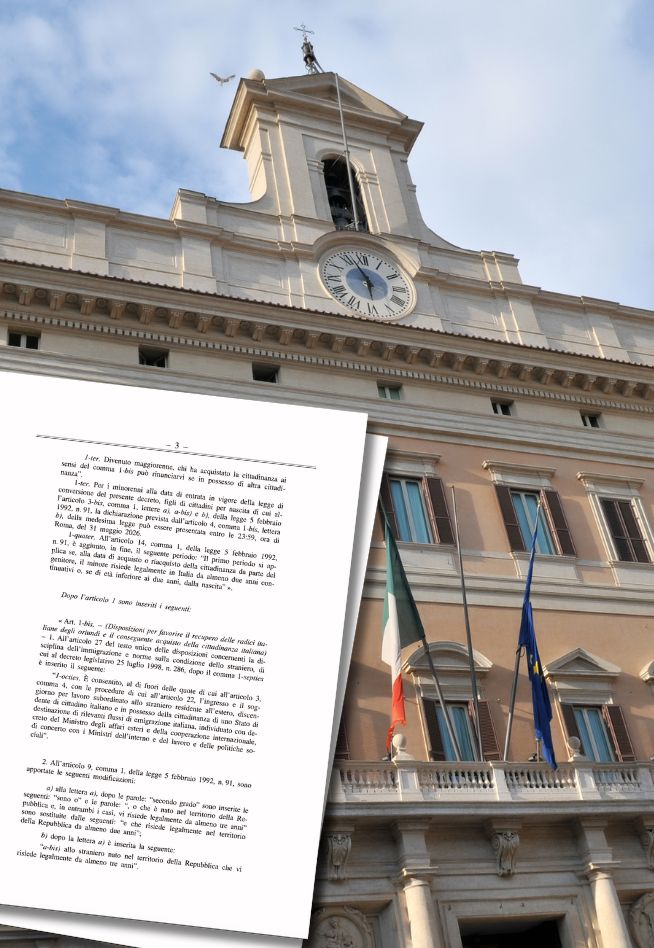Since the issuance of Decree-Law No. 36/2025 on March 28, 2025, which outlined immediate changes to the eligibility requirements for Italian citizenship by descent jure sanguinis, the Italian Parliament has undergone a review of the decree, its provisions, and discussed changes to the decree. On May 20, 2025, the Chamber of Deputies voted in favor of converting the decree into law.
Upon conversion of the decree into law, with the signature of the President of the Republic and publication in the Official Gazette (Gazzetta Ufficiale), new eligibility rules for an individual to be recognized as an Italian citizen will be as follows:
If you are an individual born abroad, either before or after the law’s date of entry into force, to be recognized as an Italian citizen, you must have either:
- A parent or grandparent who is an Italian citizen or who held exclusively Italian citizenship at the time of their death
- A parent or adoptive parent who resided in Italy for two consecutive years following their acquisition of Italian citizenship and before your date of birth or adoption
- A citizenship application was submitted to the competent consular office, Italian municipality, or filed in court, OR the interested party has received notification of an appointment to submit an application by 11:59 PM Rome Time on March 27, 2025
Recognition of Minor Children
The law also states that a minor child born abroad whose father or mother is a citizen can be recognized as an Italian citizen if the parent/guardian makes a declaration for the minor to acquire Italian citizenship and either:
- Following the declaration, the minor legally resides in Italy for at least two consecutive years
- The declaration is submitted within one year of the birth (or the date of adoption) of the minor
It’s also worth noting that as of the law’s date of entry into force, minor children of Italian may be recognized if the parent makes a declaration by 11:59 PM Rome Time on May 31, 2026.
Reacquisition of Italian Citizenship
The law also makes changes to the reacquisition criteria for those who were born in Italy and subsequently lost their Italian citizenship according to the 1912 Citizenship Law, prior to the 1992 regulations which began permitting dual citizenship.
Under this amended article to the law, individuals who were born in Italy and who lost citizenship according to provisions of Law No. 555 of 1912 can reacquire it if they make a declaration between July 1, 2025 and December 31, 2027. Previously, there was a requirement to also reside in Italy to complete the reacquisition, but this new provision removes that residence requirement.
Citizenship by Residency
The law has also amended citizenship by residency criteria (Article 9 of Law No. 91 of 1992), concerning those with Italian ancestry to the second degree. Now, if you have a parent or grandparent who is/was an Italian citizen by birth (regardless if they acquired foreign citizenship), you can apply for Italian citizenship after 2 years of residence in Italy. Previously this residence requirement was 3 years.
Other requirements for citizenship by residency remain the same, such as becoming a registered legal resident in the town where you are living for the entire duration, complete with a valid residence permit, for example, a student or work permit. Also, you would need to submit a certificate proving knowledge of the Italian language at the B1 level, which you can also obtain while in italy. In addition, criminal background check certificates and proof of income need to be submitted with your application.
For those interested in acquiring a work visa to reside in Italy, the law has included an important provision. A foreigner residing abroad that is a descendant of an Italian citizen may enter and reside in Italy for subordinate work, outside of the maximum quotas typically issued for work visas.
1948 Cases and Legal Implications
For citizenship cases that would have fallen under the “1948 rule”, requiring a judicial proceeding to be successful, there is still much discussion about the future possibility of filing such cases in the Italian courts. It’s important to remember that the converted law is to be applied at Italian consulates, Italian municipalities and Italian courts. Therefore, for court cases, judges must adhere to the law as it is written. On the other hand, judges are legally able to interpret the law in regards to provisions included in the newly converted law and in relation to the case brought before them. For instance, it may still be possible to file a 1948 case via a female ancestor (parent or grandparent) who acquired a foreign citizenship through marriage involuntarily.
Furthermore, many legal professionals and attorneys still express concern over the constitutionality of the decree-law itself, its provisions, and the subsequent converted law.
For instance, there is a strong legal argument to be made that those who took action to submit their application or make an appointment before March 28th should be subject to the previous eligibility rules. These actions could include collecting and legalizing their documents, certifying translations with a notary, or signing a power of attorney before a notary with an Italian attorney for representation of their citizenship via the Italian courts. Also, those who were unable to submit their application or book an appointment through no fault of their own can be considered significant actions warranting the usage of previous eligibility rules, such as making attempts to create an account or book an appointment with the Italian consulate, or being in the queue and waiting to schedule an appointment.
Should you have any questions or would like an ICA specialist to evaluate your eligibility, don’t hesitate to contact us directly. Also, for more information, be sure to visit italiancitizenshipassistance.com and subscribe to our Podcast.

